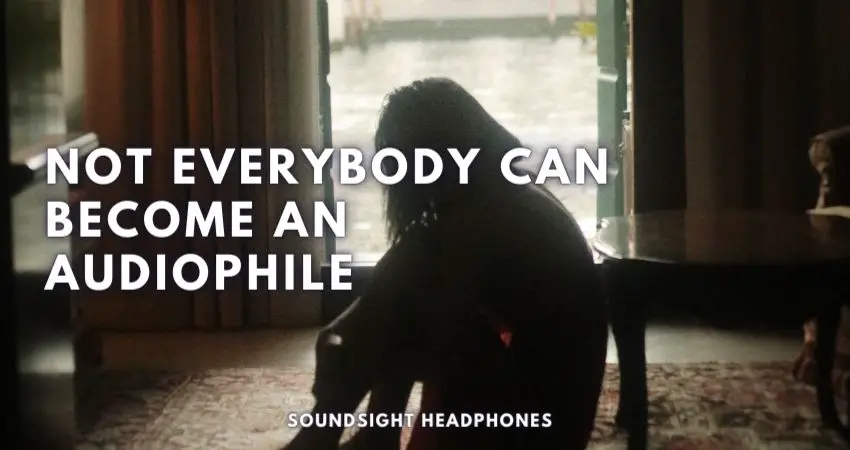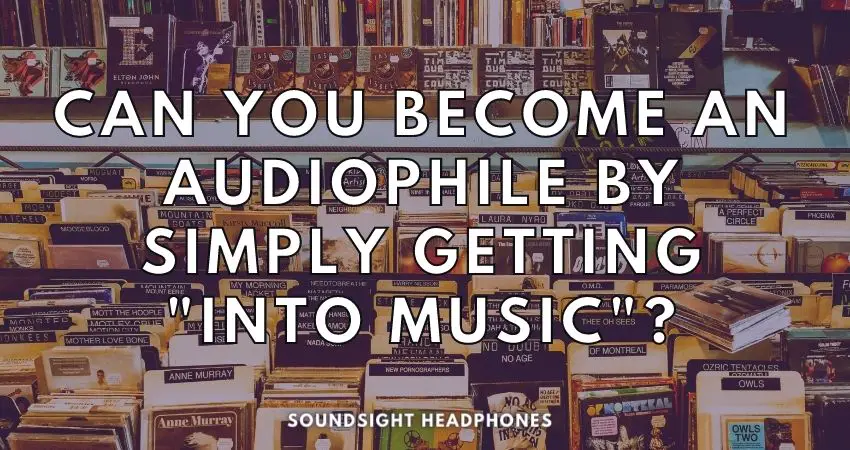Some people are born with a natural and innate sense of hearing when it comes to music, but many people can cultivate a taste for music if they put the time and effort into it. Thus, while it can be tough to hear the different layers of your favorite songs, you can start to acquire a taste for music and understand the subtle nuances of the genre as an audiophile.
This article examines whether we can all be able to appreciate current musical trends as well as previous generations of music and, in doing so, become audiophiles. The article focuses not on the “how” component but on whether you can become an audiophile by simply enjoying music.
What is an audiophile?
To understand the process it takes to become an audiophile, you must first understand what an audiophile is. “Audiophile” is a term that refers to lovers of audio and music. It takes passion and dedication to truly know and love the art of music.
But there’s more to an audiophile than just someone who loves music. Audiophiles generally love good music, music that inspires and evokes emotions. Anything less than the best isn’t worth listening to. Popular music and repetitive electronic music just won’t cut it.
As a result, audiophiles can’t just be casual listeners like you and me – they are music connoisseurs who take in as much music as possible. They’ve listened to what we listened to but moved on and experienced new genres and styles. It’s not that they want to be better than you, but they would instead find the satisfaction we get so quickly from generic music.
So, can you become an audiophile?
To become an audiophile, you must take a long and difficult path. You’ll have to listen to all kinds of music, get into the music, and let yourself absorb the essence and feel of the music.
As you listen to more and more music, your capacity to show an appreciation for all styles will increase-you start to show a preference for one or two types of music. But the process is never-ending, and your personal taste for music continues to be shaped by the numerous styles of music and songs you listen to.
You can become an audiophile simply by listening to as much music as possible, but only if you take your time to truly experience music, not just consume it. You cannot become an audiophile by listening to only one genre or without being able to discern even the subtlest nuances of music or hear the difference between octaves and instruments.
For those willing to take the time and effort to become an audiophile, some advantages and disadvantages come with it.
Advantages of being an audiophile
- First, audiophiles tend to be more informed about music and the arts.
- Audiophiles are great in music production, although sometimes they are hard to work with due to their compulsive obsession with creating flawless music.
- Your passion for music can be easily harnessed to recommend music and audio equipment to others.
- Last but not least, audiophiles can learn to appreciate all genres, even those they don’t like initially. By acquiring a more profound understanding of music, you learn to enjoy even music you dislike, which is definitely not bad.
Disadvantages of audiophiles
- Your standard for quality music reproduction can get really high. You might wonder why anyone would want to play bad music and will never be satisfied with regular headphones. This can be dangerous, as your desire for great music can cloud your judgment when exposed to crappy music or the inability to enjoy music through poorer quality audio equipment.
- You might be too critical of new music. This can create an anchor that prevents you from enjoying emerging genres and styles as much as possible or even stop you from enjoying all kinds of music.
- You can become obsessed with finding your endgame headphones or audio system. Audiophiles are notorious for not being satisfied with their setup until they reach the flagship level. Sometimes it becomes a burden, and the simple act of listening to music is ruined by the excessive scrutiny of more sophisticated equipment and expensive configurations. You no longer listen to music but analyze the imperfections of your current audio device.

Not everybody can become an audiophile
Having impaired hearing can prevent you from becoming an audiophile. If you’re struggling to hear high frequencies or can’t hear soft music notes or distinguish the difference between different timbers, you will have a hard time becoming an audiophile.
Do you have good hearing? You can check your hearing status here (if your headphones or speakers don’t reproduce high frequencies, don’t worry about not hearing them)
Obstacles faced by people who want to become an audiophile include:
- Being too busy to pay attention to music
- Not having a high-fidelity audio system or headphones
- Not having the money to buy the various components of high-end audio equipment
- Cannot differentiate the difference in sound quality between higher-end audio equipment
How to overcome these challenges:
If you’re busy and can’t listen to music, some audiophile headphones that allow you to listen to music at work can help. For example, the Audio-Technica ATH-M30X or the Beyerdynamic DT 240 PRO have closed ear cups that isolate ambient noise and make them easy to use in the workplace. These are perfect headphones to get started in the audiophile world, as they are incredibly affordable (under 100 US Dollars) and high-quality.
Once you get used to the sound quality of good headphones, you can work your way up to a more serious pair of audiophile headphones like Philips Audio SHP9500 and HiFiMAN HE400se. Trying multiple models of high-fidelity headphones will also train your ears to hear the differences between various models and appreciate the timber and other audio elements like the soundstage, instrumental separation, or sound dynamics.
The next step is to find a pair of high-end audiophile headphones for under $1000 or a home audio system. At this point, if you can afford a pair of audiophile headphones and a good sound system, you can probably invest in an audio amplifier and a DAC (digital-to-analog converter). This part is not the end of your audiophile journey, as you can continue exploring and purchasing better headphones as your budget allows. However, starting small to see if audiophile equipment fits your needs should be enough to get you started and know if you have developed a taste for high-fidelity audio.
Think you’re an audiophile?
Music does not speak to everyone in the same way, and it’s difficult for anyone to become an audiophile if they cannot perceive sound quality differences between audio file formats, distinguish between a low and high-resolution signal, or between the octaves and timbres of instruments.
To know if you’re an audiophile, you must:
- Have good hearing (which you can test here with a pair of headphones with a complete frequency range)
- Be aware of the difference between high and low-quality recordings is audible
- Have a high-fidelity headphone or audio system that can reproduce the full range of sounds in all their purity (loudness, bass, midrange & treble)
- You like good sound quality. No, you’re obsessed with it.
Your passion for music will help you enter the world of music
If you listen to music from the moment you wake up until you go to bed, your passion for music could help you reach your goal of becoming an audiophile. But you can’t become an audiophile simply by listening to music. It’s part of the process, but not the entire process, because you have to try different flavors and genres of music.
FAQ about becoming an audiophile
How do I know whether I’m an audiophile?
If you are reading this, you are probably a music lover and have been listening to all kinds of music for a long time. It’s obvious that you have a passion for music, regardless of your listening ability.
You are probably an audiophile if you listen to music deeply, carefully, and with a focus on the subtle details and nuances of the music. Paying deep attention to music and engaging your brain in listening to music is one of the characteristics of an audiophile.
If you listen to music at a very high volume, use inexpensive headphones with a bass-driven tuning, and are frustrated by the fact that some headphones don’t have enough bass, chances are you’re not an audiophile. You just like the feel of the bass.
Can anyone be an audiophile?
No, some people just don’t have the drive to buy the best headphones, amplifiers, DACs, and other audio equipment. Some people are not picky and will buy audio equipment from a popular brand despite its substandard quality. Besides, not everyone lives to listen to music and has the quality to appreciate good music. Even when listening to a high-end audio system, some people are simply not attracted to music.
On the other hand, many people have a natural passion for music and are willing to pay top dollar for the best components to enjoy their favorite tunes. These people are the most likely to become audiophiles because they have the motivation, passion, and attraction for audiophile-grade audio equipment.
Conclusion
If you love music, there’s no reason why you can’t become an audiophile. The only caveat is if you have a physiological issue that will prevent this. Ultimately, it comes down to your will and commitment to higher-quality music.
Now, considering you’re reading this, you’re probably interested in a pair of entry-level audiophile headphones to get you started. I suggest starting with a pair of open-back headphones under $100, like Philips Audio SHP9500.
